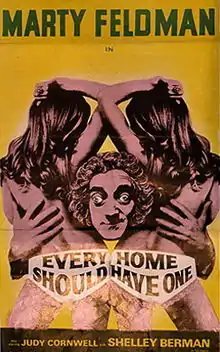Every Home Should Have One
Every Home Should Have One is a 1970 British comedy film directed by Jim Clark and starring Marty Feldman.[1] It was released in the United States in theatres and on home video under the title Think Dirty.[2]
| Every Home Should Have One | |
|---|---|
 | |
| Directed by | Jim Clark |
| Produced by | Ned Sherrin |
| Written by | Herbert Kretzmer Milton Shulman |
| Screenplay by | Herbert Kretzmer Barry Took Marty Feldman |
| Based on | Every Home Should Have One by
|
| Starring | Marty Feldman Judy Cornwell Shelley Berman |
| Music by | John Cameron |
| Cinematography | Ken Hodges |
| Edited by | Ralph Sheldon |
| Color process | Eastmancolor |
Production company | Example Productions Ltd British Lion Films Ltd |
| Distributed by | British Lion Films Ltd |
Release date |
|
Running time | 94 minutes |
| Country | United Kingdom |
| Language | English |
The overall concept is in direct ridicule of the then ongoing campaign by Mary Whitehouse on gratuitous sex in advertising (and many other fields). Certain sections such as the parish council watching entire programmes which they are offended by simply to count the offensive incidents, exactly parodies Mary Whitehouse's infamous and ironic behaviour of the time.
Plot
An advertising man is assigned by his boss to come up with a sexy new image for Mrs McLaughlin's Frozen Porridge. While his wife runs a clean-up-TV campaign organized by the local vicar, he has an affair with the au-pair girl.[3]
The overall concept is that adverts play out before their lives connecting to the products to hand.
The various porridge advertising campaigns get more and more extreme: the most relevant being the Goldilocks and the Three Bears campaign. This leads to a secondary campaign to search for "Miss Goldilocks".
Cast
- Marty Feldman as Teddy Brown
- Judy Cornwell as Liz Brown
- Garry Miller as Richard Brown, their son
- Shelley Berman as Nat Kaplan
- Hy Hazell as Mrs. Kaplan
- Julie Ege as Inga Giltenburg
- Penelope Keith as Lotte von Gelbstein
- Moray Watson as Chandler
- Jack Watson as McLaughlin
- Mark Elwes as Rokes
- Harold Innocent as Jimpson
- Dinsdale Landen as Reverend Geoffrey Mellish
- John McKelvey as Colonel Belper
- Charles Lewsen as Arthur Soames
- Maggie Jones as Hetty Soames
- Frances de la Tour as Maude Crape
- Patrick Cargill as Wallace Trufitt, MP
- Patience Collier as Mrs. Monty Levin
- Annabel Leventon as Chandler's secretary
- Sarah Badel as Joanna Snow
- John Wells as Tolworth
- Michael Bates as Magistrate
- Dave Dee as Wednesday Play Star
- Judy Huxtable as Frankenstein Heroine
Production
The film was produced at Shepperton Studios in England.[4]
The film's titles and animated sequences were provided by Richard Williams.[3] The feature's theme song, "Every Home Should Have One", was written by John Cameron, Caryl Brahms, and Ned Sherrin, arranged by Alan Tew, produced by Jackie Rand, and sung by Millicent Martin.[3] The song was released as a single to promote the film.[5]
Reception
The film was one of the most popular movies in 1970 at the British box office.[6]
References
- "Every Home Should Have One – review - cast and crew, movie star rating and where to watch film on TV and online". Radio Times.
- "Think Dirty (1970) - Jim Clark - Synopsis, Characteristics, Moods, Themes and Related - AllMovie". AllMovie.
- "BFI | Film & TV Database | EVERY HOME SHOULD HAVE ONE (1970)". Ftvdb.bfi.org.uk. 16 April 2009. Retrieved 22 January 2014.
- "Shepperton Studios". BFI.
- "Millicent Martin - Every Home Should Have One" – via www.45cat.com.
- Harper, Sue (2011). British Film Culture in the 1970s: The Boundaries of Pleasure: The Boundaries of Pleasure. Edinburgh University Press. p. 269. ISBN 9780748654260.